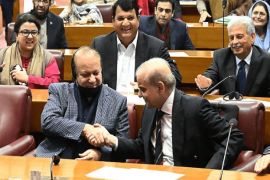Interim Prime Minister Anwaarul Haq Kakar directed relevant authorities on Sunday to devise “concrete steps” for a reduction in inflated electricity bills and present the plan to him within the next 48 hours.
He issued the directives at an emergency meeting at the PM’s Office (PMO) in Islamabad, which he announced a day ago amid countrywide protests by citizens over inflated power bills.
A day earlier, protests were held in cities across the country — which continue today — due to exorbitant electricity bills on the back of a significant increase in the national average tariff, prompting Kakar to summon an emergency meeting.
Another round of the meeting would be held tomorrow (Monday), a statement issued by the PMO said, adding that the interim premier was given a detailed briefing on the high electricity bills for July during today’s session.
Addressing the meeting, PM Kakar said, “We will not take any step in haste that will harm the country. We will take measures that won’t further burden the national exchequer and will facilitate the consumers.
“It is not possible that while the people face difficulties, high-ranked officials and the prime minister continue to consume free electricity paid for with the taxes people pay.”
Saying so, he directed relevant departments and ministries to submit to him the details of the officers who were being provided free electricity, the PMO statement said.
“I represent the common man,” he said, pledging that measures would be implemented to minimise electricity consumption at the PM House and Pak Secretariat. For that, he added, “even if the air conditioner in my room has to be turned off, do it.”
Regarding tomorrow’s session, the PM said he would hold a detailed consultation with provincial chief ministers on the exorbitant bills for July and the implementation of measures for energy conservation.
The PMO statement said he further sought a roadmap from electricity distribution companies to curb electricity theft.
Moreover, the PM directed relevant authorities to submit a short-, medium- and long-term plan for reforms in the power sector “as soon as possible”.
He later said on X that the interim government would try to provide as much relief to the people as possible while operating within its mandate.
Interim Finance Minister Shamshad Akhtar, caretaker Commerce Minister Gohar Ijaz, interim Information Minister Murtaza Solangi, adviser to PM Kakar Dr Waqar Masood, the power secretary, Water and Power Development Authority chairman, National Electric Power Regulatory Authority chairman and other relevant officials attended the meeting, according to the PMO statement.
On Saturday, the interim government devised a plan to withdraw subsidised electricity availed by Discos and government officers in grade 17 and above.
Protests held in Multan, Lahore, Karachi
Meanwhile, protests were held in Multan, Lahore and Karachi against the exorbitant power bills.
Residents and traders in Multan’s Alfalah Market took to the streets to protest against the electricity bills as they held banners and set tyres on fire, hence blocking roads.
Speaking to media one of the protestors lamented that he was the sole breadwinner of the family and his bill was Rs24,000 even though he only used “one refrigerator and fans”. He added that last month too his electricity bill was Rs23,000.
Another man said, “Flour is Rs150/kg, petrol is Rs300/litre — tell me where should I go, what should I do?”
“Should I give poison to my children?” he asked while visibly enraged. “Why is Wapda (Water and Power Development Authority) given free electricity?”
Stating that his electricity bill was Rs15,000 while house rent was Rs13,000, he asked, “Should I commit robbery? To us peaceful and pious citizens… I ask you to correct yourselves otherwise the public will not let you go.”
He then called for reducing the bills by 75pc, asserting that that was everyone’s demand.
During a press conference held by the Markazi Tanzeem-e-Tajran Pakistan, it announced initiating a “protest movement” against the excessively high bills.
The union’s chairman, Khawaja Salman Siddiqui said, “If the demands (to lower power prices) are not accepted, we will proceed towards a civil disobedience movement.”
Meanwhile, residents, including women and children, in Lahore’s Shahdara also held protests they burned this month’s bills and vowed to not pay them.
Video footage from Lahore showed a pile of bills set on fire as dozens of people of all ages gathered on the streets and chanted, “Bijli mehngi, namanzoor [Expensive electricity is unacceptable].”
One of the women said that she did not have money and her husband was a labourer, hence “could earn a wage some day and not on other days”.
“Do we satisfy our children’s hunger or get them educated?” she asked. She stated that her power bill last month amounted to Rs10,000, therefore she had not paid it. “We cannot pay this huge bill. Help us, do something.”
Another woman asked, “Do we pay [house] rent or [electricity] bills or fulfil the needs of our children?”
Separately, the Pakistan Markazi Muslim League announced the beginning of a “countrywide protest”, demanding that the interim government withdraw its decision to raise electricity prices and “enforce unannounced taxes”.
The party said in a statement it held demonstrations in Lahore, Gujranwala and Sialkot, adding that its protest would continue until its demands were met.
In the evening, Karachi traffic police posted on X that a protest against inflated power bills was staged at Aisha Manzil.







